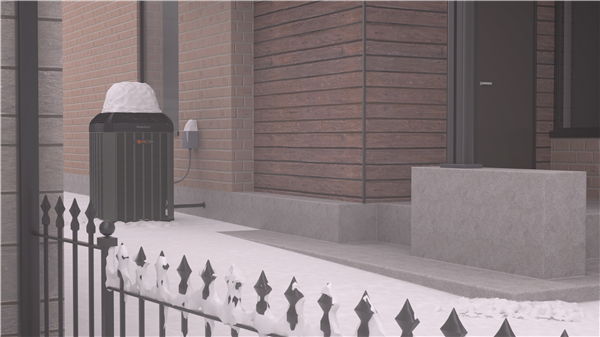With the arrival of winter, many of us hunker down in our PJs for the months ahead or plan a tropical getaway. Regardless of how you plan on staying warm this winter, there’s plenty of other things to consider when you’re preparing for the cold season ahead, like winterizing your home before the snow hits.
While it might not seem like an essential task, winterizing your home can be the key difference in experiencing high energy bills, freezing pipes, and keeping the cold air out of your home. If you’re ready to keep your house protected this winter, take a look at our five steps to winterize your house.


It’s easy to feel inclined to turn up the heat and hope it will keep the cold air at bay. But the truth is, cranking the heat won’t do much besides raising your energy bills and filling certain pockets in your home with warm air. If you’re planning on going out of town, having the heat running while you're gone isn’t the ideal long term solution. If you truly want to winterize your house, while saving money, we have some ideas for how you can save energy this winter.
One of the easiest and most affordable fixes is covering your doors and windows. Many windows aren’t insulated properly for winter, in which case it’s in your best interest to get insulated curtains. This will keep the cold air out and reduce your overall energy bill by keeping warm air in and reducing the strain on your heating system.
Another great way to protect your doors and windows is by caulking any cracks you see. It’s easy to dismiss one or two cracks or exposed edges on your door, but those cracks will just contribute to the heat loss in your home. Harsh weather strips the outside of your doors and windows, so it’s also a good idea to check for damage before the coldest winter months.
Insulation is your very best friend during the winter. Just think of it this way - if you need additional layers to keep warm, so will your attic and pipes.
Your attic, or crawl space, is very susceptible to moisture build-up during this time. Water leaks could form in your attic due to poor insulation during icy weather. While this type of installation is important, it might not pose the same kinds of risks as frozen pipes.
Frozen pipes can occur if the area becomes too cold or icy, which can make them burst and flood your home. It’s important to insulate your exterior or exposed pipes to make sure they can continue running and send water to your interior pipes. The last thing you need is to be worried about coming home to a flooded basement or kitchen. If you plan on leaving for an extended period of time, turn off the water supply to eliminate the risk of frozen pipes altogether.
Pipe wraps and sleeves are a great way to wrap your pipes, as well as faucet covers. Also, keep an eye out on your water heater. Just like your HVAC system, routine maintenance is important to keep your home safe all year long.
It’s important to have your heating system checked on an annual basis. The last thing you’ll want is a broken heater in the middle of winter. It’s important to check and see that your filters are clean, and that your boiler is working at optimal speed, so you’ll never have to worry about freezing pipes. Contacting a local HVAC service provider like Swaim Electric will guarantee prompt service and annual maintenance that will protect you year-round.
During the cold season ahead, it’s important to check your crawlspace. Many homes in North Carolina have ventilated crawl spaces, but it’s a good idea to have your vents be closed off during the winter to keep cold air outside and not in your crawlspace. The cold will just cause your bills to skyrocket, and could risk additional damage to your home. However, there are other types of ventilation systems. For instance, an open foundation vent, because of the way it’s installed in your home, will make your floors feel much colder. As this spreads, other rooms in your home will feel colder, which ends up costing you more in the long run.
Your pipes are more likely to freeze if the cold air is coming into your crawl space. Once the air warms back up, it’s a good idea to reopen the vents, to help ventilate the crawlspace when it warms back up outside.
We promise not to fill your inbox with spam!
